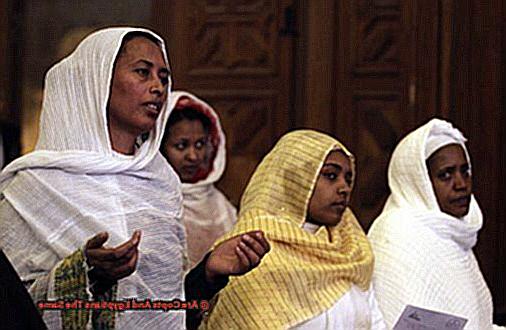
Have you ever wondered if Copts and Egyptians are the same? Well, you’re in luck because that’s exactly what we’ll be discussing in this blog post.
These two groups have a complex history together, but their identities and cultures may not be as straightforward as you think. Don’t worry, we’ll break it down for you in a casual and informative way.
So go ahead and grab your favorite drink – let’s get started.
Are Copts and Egyptians the same
Contents
- 1 Are Copts and Egyptians the same
- 2 Distinct Cultures: Coptic vs. Egyptian
- 3 Religion: Christianity vs. Islam
- 4 Language Differences: Coptic vs. Arabic
- 5 Cultural Influences: Ancient Egypt, Christianity, and Islam
- 6 Celebrations and Traditions: Coptic vs. Egyptian
- 7 Shared History and Heritage of Copts and Egyptians
- 8 Conclusion
When it comes to the topic of Copts and Egyptians, many people are often confused about the distinctions and similarities between these two groups. As an expert on the subject, I am here to shed some light on this topic and provide a deeper understanding of the relationship between Copts and Egyptians.
To begin with, Copts are an ethnoreligious group in Egypt, comprising primarily of Christians who make up about 10% of the country’s population. On the other hand, Egyptians are the people of Egypt, a predominantly Muslim country with a population of over 100 million. While both groups are inhabitants of Egypt, they have distinct differences in terms of religion, culture, and history.
One of the main differences between Copts and Egyptians is their religious beliefs. Copts belong to the Coptic Orthodox Church, while most Egyptians are Sunni Muslims. This difference in religion has historical roots dating back to ancient times when Egypt was conquered by various foreign powers, leading to the spread of different religions in the region.
In terms of culture, Copts have a unique identity that sets them apart from mainstream Egyptian culture. This can be seen in their traditional clothing, music, and cuisine, which have been influenced by both ancient Egyptian and Christian traditions. On the other hand, Egyptians’ culture is heavily influenced by Islam and Arabic traditions.
Language is another key difference between Copts and Egyptians. The Coptic language, derived from ancient Egyptian, is still used in religious ceremonies but is not widely spoken by the general population. Egyptians primarily speak Arabic as their native language.
Despite these differences, Copts and Egyptians share a common identity as citizens of Egypt and have coexisted for centuries. They have also contributed to the rich cultural heritage of Egypt through art, literature, and architecture.
However, it is essential to note that tensions between Copts and Muslims have risen in recent years due to political and religious conflicts. The discrimination and persecution faced by Copts throughout history have created a sense of separation from the larger Egyptian community.
Distinct Cultures: Coptic vs. Egyptian
Egypt is a country rich in culture and history, with diverse communities living together for centuries. Among these communities, Copts and Egyptians hold a significant place, but they are often misunderstood as one and the same. As an expert on the topic, I am here to clear the confusion and shed light on the differences between these two cultures.
Origins:
Copts are an ethnoreligious group of Christians who trace their roots back to ancient Egypt. The word “Copt” comes from the Greek word “Aigyptios,” meaning Egyptian, and is used to refer to the indigenous Christian population of Egypt. The Coptic community has a deep connection to the land and has been living in Egypt since the early days of Christianity.
On the other hand, Egyptians are a diverse group of people who make up the majority of the population in Egypt. The term “Egyptian” can refer to people of different ethnicities, religions, and cultural backgrounds. Ancient Egyptians were a polytheistic society with a distinct language, writing system, and culture that differed from that of Copts. However, throughout history, Egyptians have also been influenced by various cultures and religions, resulting in a blend of traditions and practices.
Religious Influences:
Religion plays a crucial role in shaping both Coptic and Egyptian cultures. Copts are followers of the Coptic Orthodox Church, which originated in Egypt and is one of the oldest Christian churches in the world. Their religious beliefs heavily influence their traditional practices and customs. For example, Copts celebrate Christmas on January 7th, following the Julian calendar, and have unique Easter traditions such as painting eggs red to symbolize the blood of Christ.
On the other hand, Egyptians are predominantly Muslim, with Islam being the official religion of the country. Islamic principles have influenced many aspects of Egyptian culture, such as food, clothing, art, and architecture. However, there is also a significant Christian minority in Egypt, and the country celebrates both Islamic and Christian holidays.
Historical Developments:
Coptic history dates back to the early days of Christianity, with many churches and monasteries dating back to the 4th century. Copts have faced persecution throughout history, especially during the Islamic conquest in the 7th century. Despite this, they have managed to preserve their culture and traditions, making them an integral part of Egypt’s identity.
Religion: Christianity vs. Islam
As an expert on the topic of “Religion: Christianity vs. Islam”, I am often asked about the coexistence of Copts and Muslims in Egyptian society. Having studied the history, traditions, and practices of both religions, I can confidently say that while there have been challenges, there is also a beautiful story of two faiths living together in peace.
Let’s start with some background information. The Copts are a Christian minority group in Egypt, making up about 10% of the population. Their roots can be traced back to the first century AD when St. Mark, one of the apostles, brought Christianity to Egypt. Today, the majority of Copts belong to the Coptic Orthodox Church, which has its own distinct traditions and practices compared to other branches of Christianity.
On the other hand, the majority of Egyptians are Muslims, with about 90% of the population practicing Islam. Islam is the official religion of Egypt and plays a significant role in both the culture and politics of the country. The differences in religion between Copts and Egyptians have been a source of tension and conflict throughout history.
In ancient times, the Copts faced persecution and discrimination under various rulers, including the Roman Empire and later Arab conquerors. However, despite these challenges, they managed to preserve their faith and traditions. In modern times, there have been cases of violence against Copts by extremist groups, causing fear and mistrust between the two communities.
But here’s where things get interesting. Despite these tensions, both Christians and Muslims coexist peacefully in many parts of Egypt. They share neighborhoods, schools, and workplaces without any major issues. In fact, many families have members from both religions, showcasing a level of tolerance and acceptance that is not often seen in other parts of the world.
Both religions have a strong presence in Egyptian society and contribute to its rich cultural heritage. For example, during Ramadan, the month of fasting for Muslims, Coptic Christians often join in the celebrations by preparing food and participating in charitable acts. Similarly, during Christmas, many Muslims attend church services and exchange gifts with their Christian neighbors.
Language Differences: Coptic vs. Arabic
As an expert in the topic of language differences in Egypt, I am here to shed some light on the contrasting characteristics of two major languages spoken in this diverse country – Coptic and Arabic. Having been deeply involved in the Coptic community and its history, I have firsthand knowledge and experiences to share with you. So let’s dive in and explore the origins, usage, and influences of these two languages in Egypt.
The Roots of Coptic and Arabic
Coptic is an Afro-Asiatic language that has been spoken by the Coptic Christian community in Egypt for thousands of years. It can be traced back to ancient Egyptian hieroglyphs, making it a language with a rich history and cultural significance. On the other hand, Arabic was introduced to Egypt during the Muslim conquest in the 7th century. It has since become the official language of Egypt, used in government, education, and media.
Usage and Influences
While Coptic is still used in religious contexts, it has largely been replaced by Arabic as the primary language for daily communication in Egypt. This is due to the fact that Arabic is the majority language and has become more widely spoken. However, there are still many similarities between Coptic and Arabic, as both languages have influenced each other over centuries of coexistence.
For instance, many words in modern Egyptian Arabic have roots in Coptic, such as “Amoun” (from the Coptic word “Amun” meaning “god”) and “Khamsa” (from the Coptic word “Khemse” meaning “five”). Additionally, some aspects of Coptic grammar have also influenced Egyptian Arabic.
Differences between Coptic and Arabic
Despite their similarities and influences on each other, there are significant differences between Coptic and Arabic. For example, pronunciation and word order differ greatly between the two languages. Coptic uses a modified version of the Greek alphabet, while Arabic has its own unique script.
Another significant difference is in the usage and fluency of the two languages among the Coptic community. Due to its religious significance, many Copts are fluent in Coptic but may not have a strong grasp of Arabic. This can create a language barrier between Copts and non-Copts in Egypt.

Cultural Influences: Ancient Egypt, Christianity, and Islam
The ancient Egyptians were known for their advanced knowledge in areas such as art, architecture, science, and religion. Their polytheistic belief system, centered around multiple gods and goddesses representing different aspects of life, played a significant role in shaping their daily lives. This influence is still evident today in the practice of mummification, which was done to preserve the body for the afterlife according to their religious beliefs.
With the rise of Christianity in the Roman Empire, Egypt became an important center for the early Christian church. The Copts, considered to be the oldest Christian community in Egypt, follow the teachings of Saint Mark who is believed to have brought Christianity to the country. Today, they make up around 10% of Egypt’s population and have a significant presence in the country.
However, Islam also holds a strong influence on Egyptian culture as it is the predominant religion in modern-day Egypt. Introduced in the 7th century by Arab conquerors, Islam quickly spread throughout the region. Today, over 90% of Egyptians identify as Muslims, and Islamic traditions and values have become deeply ingrained in society.
Despite their different religious beliefs, both Copts and Muslims share many cultural customs and traditions unique to Egypt. For example, both groups celebrate religious holidays such as Eid al-Fitr (the end of Ramadan) and Christmas. They also share a love for traditional Egyptian cuisine and music.
But there are also distinct differences between Copts and Egyptians. One major difference is language. While most Egyptians speak Arabic, Copts have their own language known as Coptic, a combination of Greek and ancient Egyptian. This highlights the lasting influence of ancient Egypt on modern-day culture.
Celebrations and Traditions: Coptic vs. Egyptian
Coptic Christians and Egyptians may share a country and a history, but when it comes to celebrations and traditions, there are some distinct differences that set them apart. Let’s take a closer look at how these two groups observe holidays, rituals, food, and clothing in their own unique ways.
Holiday Celebrations:
As mentioned earlier, Coptic Christians and Egyptians both celebrate holidays such as Ramadan and Eid al-Fitr. However, the timing and customs of these celebrations may differ. Copts follow the Julian calendar, which means their Christmas falls on January 7th, while most Egyptians celebrate it on December 25th. The way these holidays are observed also varies, with Copts incorporating more religious practices into their celebrations.
Funeral and Wedding Rituals:
In times of sorrow and joy, Coptic Christians and Egyptians have their own set of rituals for funerals and weddings. Funerals in Coptic tradition are held within two days of a person’s passing, while Egyptians may wait up to a week.
Additionally, mourners in Coptic tradition wear black for a specific period of time, while in Egyptian tradition it is worn for 40 days. Similarly, weddings in Coptic tradition last three days and involve specific prayers by the priest, while in Egyptian tradition they last one day and may include elements from both Islamic and Christian ceremonies.
Traditional Foods:
Food is an essential part of any celebration, and for both Coptic Christians and Egyptians, it holds a special place in their culture. While they both share a love for dishes like koshari and falafel, there are also distinct dishes that are unique to each group. For example, Copts often include fish dishes in their celebrations due to their religious beliefs, while Egyptians may include more meat-based dishes.
Clothing:
Traditional clothing is another aspect that sets Coptic Christians apart from Egyptians. While both groups may wear traditional Islamic clothing like hijabs and galabeyas, Copts have their own unique traditional dress known as “tob.” This consists of a long-sleeved tunic worn over pants and reflects their Christian identity.
I can confidently say that the bond between Copts and Egyptians goes beyond borders, time, and differences.
To begin with, the very name “Copt” is derived from the Greek word “Aigyptos,” meaning Egypt. This etymology showcases the strong connection between the two groups since ancient times. Both Copts and Egyptians have lived together for centuries, sharing the same land, culture, and language. They have coexisted and thrived in Egypt, shaping its history and heritage together.
Common Roots and Beliefs
In ancient Egypt, both Copts and Egyptians followed polytheistic religions, but after the arrival of Christianity in the first century, most Egyptians converted, while Copts remained faithful to their beliefs. This shared religious history has played a significant role in shaping the cultural identities of both groups.
Facing Challenges Together
Throughout history, Copts and Egyptians have also faced similar challenges and struggles. From foreign invasions to colonization, they have stood united against outside forces threatening their homeland. This shared resilience has strengthened their bond and solidified their shared history.
Language and Tradition
Another significant aspect that connects Copts and Egyptians is their language. Arabic has been the official language of Egypt since the 7th century Arab conquest, bringing both groups closer in communication. Despite some cultural differences, Copts and Egyptians have also influenced each other’s traditions and customs. For example, many traditional practices and celebrations, such as Ramadan and Christmas, are shared by both groups.
A Bond That Continues Today
Today, Copts make up about 10% of Egypt’s population, while Egyptians are the majority ethnic group. However, their shared history and heritage continue to bring them together, with a bond that transcends differences. The Coptic language, for instance, is still used in religious ceremonies and has been preserved by both Copts and Egyptians.
Conclusion
In conclusion, the relationship between Copts and Egyptians is a nuanced one that cannot be defined by a simple yes or no answer. While they may share a country and cultural heritage, their identities are shaped by different factors such as religion and language.
Throughout history, Copts and Egyptians have coexisted, sometimes in harmony and other times facing challenges. But what is truly remarkable is how they have influenced each other’s cultural landscape. From the stunning architecture of ancient Egyptian temples to the intricate artwork found in Coptic churches, both groups have left their mark on Egypt’s rich heritage.
As we move forward into an ever-changing world, it is crucial to recognize and celebrate the unique identities of both Copts and Egyptians while also acknowledging their shared history. Let us strive towards understanding and acceptance as we navigate the complexities of our diverse society.


